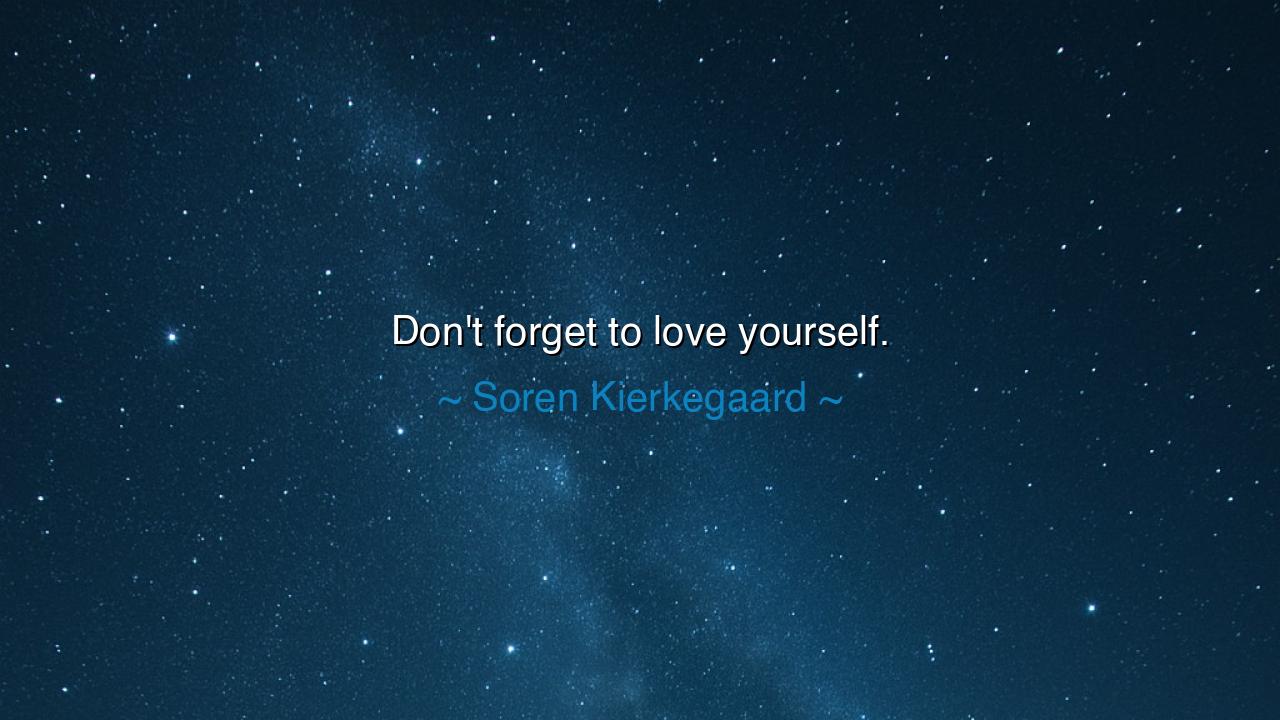
Don't forget to love yourself.






"Don't forget to love yourself." – Søren Kierkegaard
In these gentle yet piercing words, Søren Kierkegaard, the great Danish philosopher of the soul, offers a reminder that rings through the ages: “Don’t forget to love yourself.” Though simple in its phrasing, it speaks to one of the most profound truths of existence — that love, if it is to be true and enduring, must begin within. Kierkegaard, the thinker of inwardness and faith, understood that the foundation of all love — for others, for God, for the world — is the love we hold for our own being. Without it, every other affection trembles like a house built on sand.
To love yourself is not to worship the self, nor to sink into pride or vanity, but to honor the divine spark within you — the sacred image of life that has been placed in your heart. Kierkegaard lived in a time when duty and despair often crushed the human spirit beneath expectation and guilt. Through his writings, he sought to awaken the soul to its sacred individuality — to remind each person that they are not a mere shadow in the crowd, but a unique expression of the eternal. To love yourself, then, is to recognize your worth, your responsibility, and your divine origin. It is to say: “I, too, am a child of creation, deserving of compassion.”
The ancients, too, knew this truth. The Oracle of Delphi bore the inscription: “Know thyself.” But Kierkegaard goes further — knowledge alone is not enough. One may know oneself and still despise what is known. Thus, he commands not only knowledge, but love. To love oneself is to forgive one’s own frailties, to nurture the spirit through kindness, and to walk through life as both teacher and friend to one’s own heart. It is to embrace both the light and the shadow within, knowing that each is part of the great work of becoming whole.
Consider the life of Eleanor Roosevelt, who began her journey as a shy and wounded child, convinced she was unloved and unwanted. Through years of struggle and reflection, she learned to see her own value, to treat herself with patience and care. That self-love became the wellspring of her power — allowing her to love others fiercely, to fight for justice, to stand unbroken in a world that often misunderstood her. Her life became living proof of Kierkegaard’s wisdom: that the love we give to ourselves becomes the strength from which we love the world.
Yet Kierkegaard’s words also carry a warning — “Don’t forget.” For it is easy to forget oneself in the noise of life, in service to others, in pursuit of perfection or acceptance. Many give their love freely to friends, to family, to causes — yet starve their own hearts of the same compassion. They exhaust themselves in generosity but neglect the inner garden, until nothing remains to give. To forget to love oneself is to dim one’s own light, and when the flame falters, even the brightest acts of love grow cold.
To love yourself is an act of both humility and courage. It means facing your own flaws without judgment, and tending to your wounds with care. It means resting when weary, forgiving your failures, and remembering that you are worthy not because of what you achieve, but because of what you are. It is the love that asks nothing of you except that you remain true to the soul you have been given. For the one who loves themselves rightly — not selfishly, but with reverence — becomes a well of peace, capable of giving love endlessly to others.
So, my children of the spirit, take this teaching to heart: Do not forget to love yourself. In your striving, remember to rest. In your giving, remember to receive. Speak to yourself not as an enemy but as a beloved friend. When you stumble, lift yourself with gentleness; when you triumph, rejoice without shame. For as the river cannot flow without its source, you cannot pour love into the world without first filling your own heart.
In the end, Kierkegaard’s wisdom calls us to balance — to love outwardly without losing inward grace. The world may teach you to sacrifice endlessly, to measure your worth by how much you give away. But the eternal voice within whispers otherwise: “Love begins here.” When you honor yourself as a creation of the divine, when you hold yourself with tenderness and truth, you fulfill the first duty of all love — the love that makes all others possible. And in that sacred remembering, you become what you were always meant to be: a living vessel of compassion, shining from the inside out.






AAdministratorAdministrator
Welcome, honored guests. Please leave a comment, we will respond soon